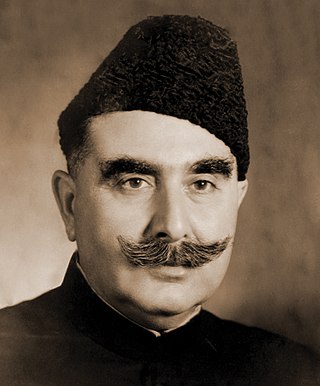
Gujranwala is a city and capital of Gujranwala Division located in Pakistan. It is also known as "City of Wrestlers" and is quite famous for its food. It is the 5th most populous city proper after Karachi, Lahore, Faisalabad and Rawalpindi respectively. Founded in the 18th century, Gujranwala is a relatively modern town compared to the many nearby millennia-old cities of northern Punjab. The city served as the capital of the Sukerchakia Misl state between 1763 and 1799, and is the birthplace of the founder of the Sikh Empire, Maharaja Ranjit Singh.

Christianity is the third largest religion in Pakistan and the second largest Abrahamic religion there, making up about 1.37% of the population according to the 2023 Census. Of these, approximately half are Catholic and half Protestant. A small number of Eastern Orthodox Christians, and Oriental Orthodox Christians also live in Pakistan.

Sardar Abdur Rab Nishtar was a Pakistani independence activist and politician from the North-West Frontier Province. He served as the first Minister of Communications of Pakistan from August 1947 to August 1949 and then as the second Governor of West Punjab from August 1949 to November 1951.
Sectarian violence in Pakistan refers to violence directed against people and places in Pakistan motivated by antagonism toward the target's religious sect. As many as 4,000 Shia are estimated to have been killed in sectarian attacks in Pakistan between 1987 and 2007, and thousands more Shia have been killed by Salafi extremists from 2008 to 2014, according to Human Rights Watch (HRW). Sunni Sufis and Barelvis have also suffered from some sectarian violence, with attacks on religious shrines killing hundreds of worshippers, and some Deobandi leaders assassinated. Pakistan minority religious groups, including Hindus, Ahmadis, and Christians, have "faced unprecedented insecurity and persecution" in at least two recent years, according to Human Rights Watch. One significant aspect of the attacks in Pakistan is that militants often target their victims places of worship during prayers or religious services in order to maximize fatalities and to "emphasize the religious dimensions of their attack".

The Ahmadiyya branch of Islam has been subjected to various forms of religious persecution and discrimination since the movement's inception in 1889. The Ahmadiyya Muslim movement emerged within the Sunni tradition of Islam and its adherents believe in all of the five pillars and all of the articles of faith required of Muslims. Ahmadis are considered non-Muslims by many mainstream Muslims since they consider Mirza Ghulam Ahmad, the founder of the movement, to be the promised Mahdi and Messiah awaited by the Muslims.
The December 2009 Lahore attacks were a series of two bomb blasts and a shooting which occurred in a crowded market in Lahore, Pakistan on 7 December 2009. At least 54 people were killed & about 150 others wounded.

The May 2010 Lahore attacks, also referred to as the Lahore massacre, occurred on 28 May 2010, in Lahore, Punjab, Pakistan, during Friday prayers. 94 people were killed and more than 120 others were injured in nearly simultaneous attacks against two mosques of the minority Ahmadiyya community. After the initial attack, a hostage situation lasted for hours. Tehrik-i-Taliban Pakistan, as well as their Punjab wing, claimed responsibility for the attacks and were also blamed by the Pakistani Police.
Jamaat Ahle Sunnat is a Muslim religious organization in Pakistan that represents the Barelvi movement. It is supported by Mashaikh including all spiritual centers. As a Sunni organisation it has adopted many Sufi customs and traditions. Jamaat e Ahle Sunnat is a representative of sunni(sufi) nation of Pakistan. It works under the superivision of spiritual centers including Golra Sharif, Sial Sharif, Pakpattan Sharif, AliPur Syedan Sharif and others. Pir of Golra Sharif is the current pattern in chief of the organization.

The July 2010 Lahore bombings occurred on 1 July 2010 in Lahore, Punjab, Pakistan. Two suicide bombers blew themselves up at the Sufi shrine, Data Darbar Complex. At least 50 people were killed and 200 others were hurt in the blasts. It was the biggest attack on a Sufi shrine in Pakistan since 2001.

Nasreddin Murat-Khan was a Russian-born Pakistani architect and civil engineer. He is renowned for designing the iconic national monument, the Minar-e-Pakistan. He was also the architect of the Gaddafi Stadium and several other notable buildings and structures.
Persecution of Christians in Pakistan has been recorded since the country's independence in 1947. The persecution has taken many forms, including violence, discrimination, and blasphemy laws.
In 2006, 30 terrorist attacks, including 10 of a sectarian nature, took place, leaving 100 people dead and 230 others injured.
In 2002, 14 terrorist, insurgent and sectarian-related incidents were reported that killed 60 people and injured 150.
Religious discrimination in Pakistan is a serious issue for the human rights situation in modern-day Pakistan. Christians, Hindus, Sikhs, Shias, and Qadiyanis among other religious minorities often face discrimination and at times are even subjected to violence. In some cases Christian churches and the worshippers themselves have been attacked. Although, there is very little record of this. Khawaja Nazimuddin, the 2nd Prime Minister of Pakistan, stated: "I do not agree that religion is a private affair of the individual nor do I agree that in an Islamic state every citizen has identical rights, no matter what his caste, creed or faith be".
This is a list of terrorist incidents in Pakistan in 2015.

Jamaat-ul-Ahrar was a terrorist organization that split away from Tehrik-i-Taliban Pakistan in August 2014. The group came to prominence after it claimed responsibility for the 2014 Wagah border suicide attack. In August 2020, it merged back to TTP.

On 15 March 2015, two explosions took place at Roman Catholic Church and Christ Church during Sunday service in Youhanabad, Lahore, Pakistan. At least 15 people were killed and seventy were wounded in the attacks.

On 27 March 2016, on Easter Sunday, at least 75 people were killed, and over 340 were injured, in a suicide bombing that hit the main entrance of Gulshan-e-Iqbal Park, one of the largest parks in Lahore, Pakistan. The attack targeted Christians who were celebrating Easter. The majority of the victims were women and children. Jamaat-ul-Ahrar, a group affiliated with the Pakistani Taliban, claimed responsibility for the attack. The attack led to worldwide condemnation and national mourning throughout Pakistan. Pakistan also launched a widespread counter-terrorism operation in South Punjab, arresting more than 200 people who may have had a possible connection to the attack.

Persecution of Sufis over the course of centuries has included acts of religious discrimination, persecution, and violence both by Sunni and Shia Muslims, such as destruction of Sufi shrines, tombs and mosques, suppression of Sufi orders, murder, and terrorism against adherents of Sufism in a number of Muslim-majority countries. The Republic of Turkey banned all Sufi orders and abolished their institutions in 1925, after Sufis opposed the new secular order. The Islamic Republic of Iran has harassed Sufis, reportedly for their lack of support for the government doctrine of "governance of the jurist".
Terrorist incidents in Pakistan in 2017 include, in chronological order:








